Mass graves uncovered in the wake of Syrian president’s ouster
Mass graves which a Syrian advocacy group says are filled with the bodies of more than 100,000 of ousted President Bashar al-Assad’s torture victims have been uncovered. Warning: graphic.
World
Don't miss out on the headlines from World. Followed categories will be added to My News.
The Assad regime used unimaginable tactics to cram as many bodies as possible into a series of horror mass graves on the outskirts of Damascus according to a Syrian advocacy group.
The head of US based Syrian Emergency Task Force, Mouaz Moustafa, told America’s ABC News he knew of at least four mass graves which spanned six or seven metres deep, four metres wide and up to 150 metres in length.
He believes the graves may contain the bodies of more than 100,000 people who went missing under Assad’s reign of terror.
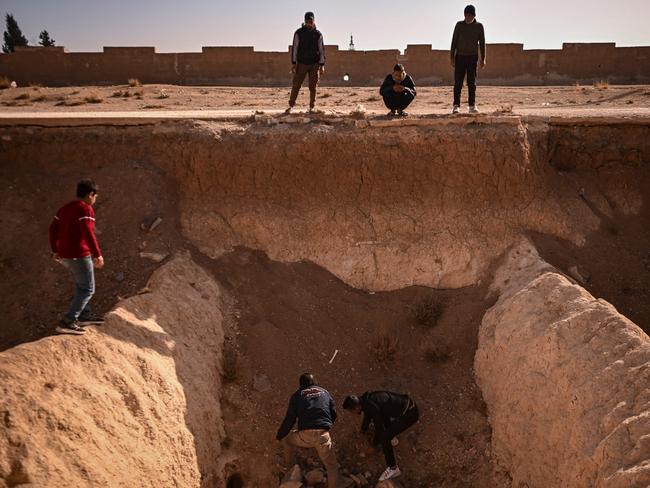
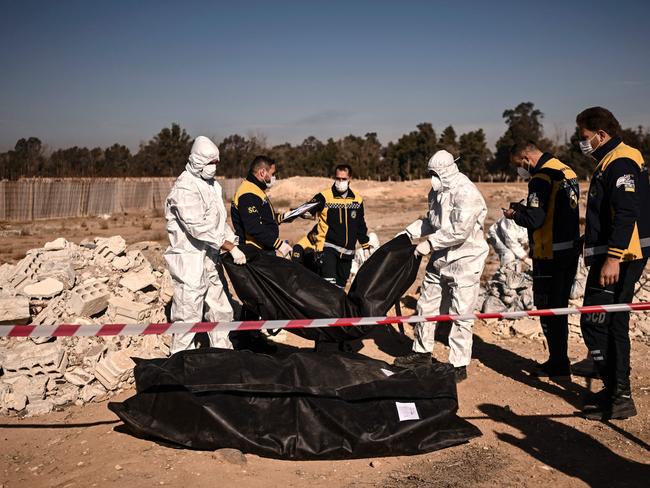
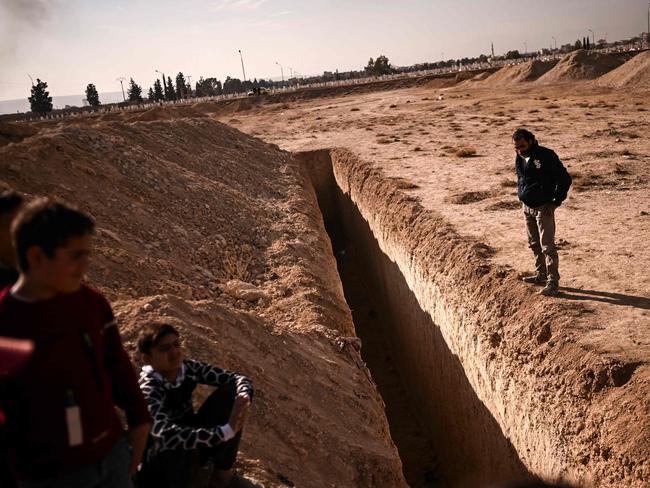
“In my conversation with the gravediggers, they told me that four tractor trailer trucks each carrying over 150 bodies came twice a week from 2012 until 2018,” Mr Moustafa said.
“The bulldozer excavator driver described how intelligence officers forced workers to use the bulldozer to flatten and compress the bodies to make them fit and easier to bury before digging the next line or trench.
Mr Moustafa said the victims in the graves were “tortured to death” by Assad’s regime.
FOLLOW UPDATES BELOW:
ASSAD BREAKS HIS SILENCE
Bashar al-Assad has spoken out for the first time since he was ousted as Syria’s prime minister saying that his departure was not planned and that Moscow requested his evacuation from a military base that was under attack.
“My departure from Syria was neither planned nor did it occur during the final hours of the battles,” Assad said in a statement posted to the Telegram channel.
“Moscow requested … an immediate evacuation to Russia on the evening of Sunday December 8”, he said, which was after Assad moved to Latakia early that day.
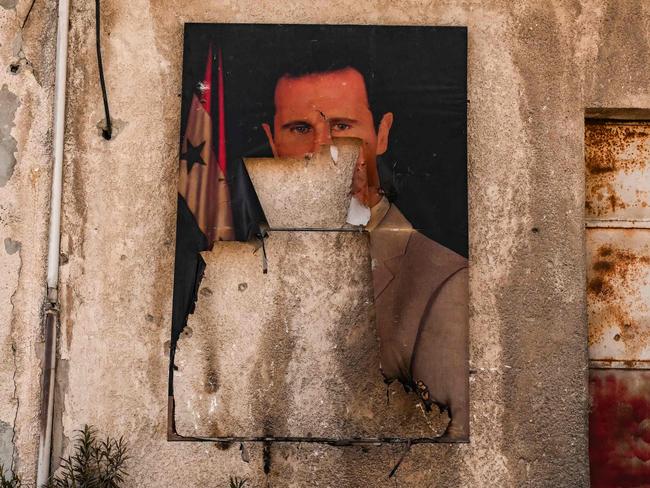
“When the state falls into the hands of terrorism and the ability to make a meaningful contribution is lost, any position becomes void of purpose,” the statement added.
Assad added that he only left once Damascus had fallen and denounced the country’s new leaders as “terrorists”.
He fled to Russia just over a week ago, as a lightning offensive spearheaded by the Islamist Hayat Tahrir al-Sham (HTS) wrested from his control city after city until the rebels reached the Syrian capital.
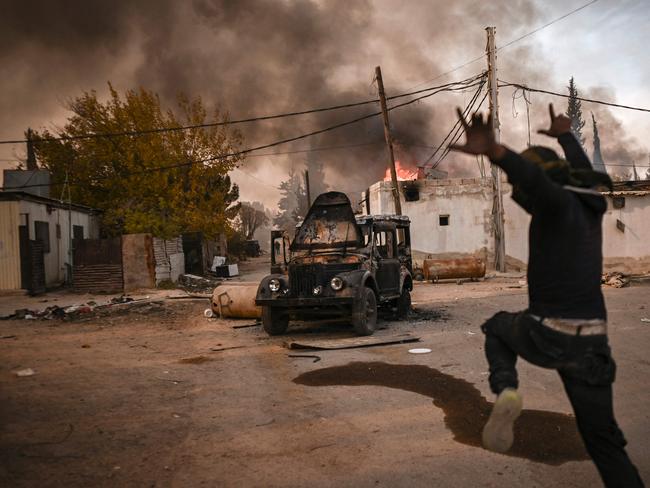
The collapse of Assad’s rule stunned the world and sparked celebrations around Syria and beyond, after his crackdown on democracy protests in 2011 sparked one of the deadliest wars of the century.
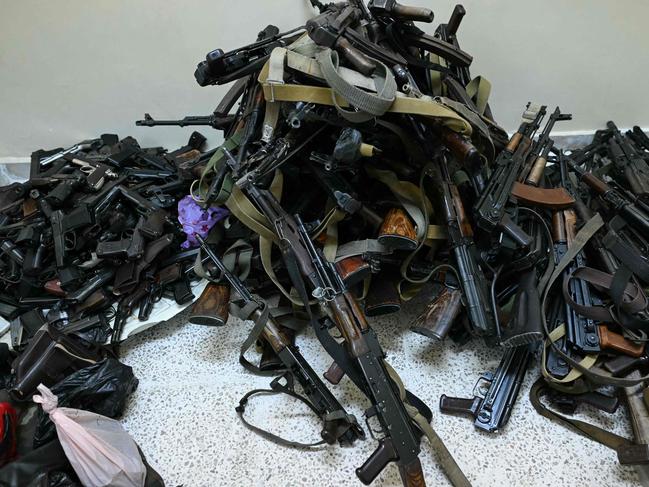
ISRAEL DROPS ‘EARTHQUAKE BOMB’ ON SYRIA
A massive explosion in Syria following an Israeli strike against a munitions depot was so large it is said to have measured as a 3.0 magnitude earthquake.
A Syria war monitor said early Monday that Israeli strikes had targeted military sites in Syria’s coastal Tartus region, calling them “the heaviest strikes” in the area in more than a decade.
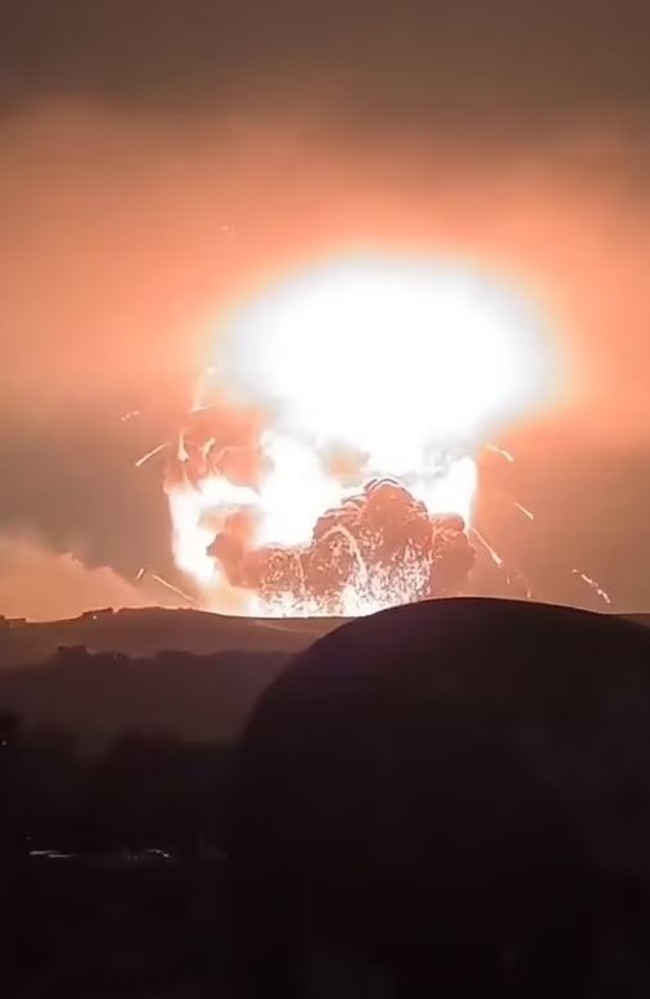
“Israeli warplanes launched strikes” targeting a series of sites including air defence units and “surface-to-surface missile depots”, said the Syrian Observatory for Human Rights, in what it said were “the heaviest strikes in Syria’s coastal region since the start of strikes in 2012”.
Tartus is the location of Russia’s naval base, as well as an ammunition depot.
Together with the Hmeimim military airfield, the sites are key to Russia maintaining its influence in the Middle East, in the Mediterranean basin and as far as Africa.
Following an 11-day offensive, a rebel coalition dominated by Islamist group Hayat Tahrir al-Sham (HTS) overthrew Al-Assad, who fled to Russia along with his family.
His fall from power was a serious setback for Moscow, which was along with Iran the main ally of the former Syrian president and which had intervened militarily in Syria since 2015.
UN PLEADS FOR AID, ACCOUNTABILITY
A week after a lightning rebel offensive toppled entrenched dictator Bashar al-Assad, the United Nations special envoy for Syria has called for justice to prevail, not revenge.
Syrians are only now beginning to scratch the surface of the atrocities committed during Assad’s regime, after the former despot fled the country for Russia.
“We need to see of course justice and accountability for crimes,” UN envoy Geir Pedersen said after arriving in Damascus.
“And we need to make sure that that goes through a credible justice system, and that we don’t see any revenge.”
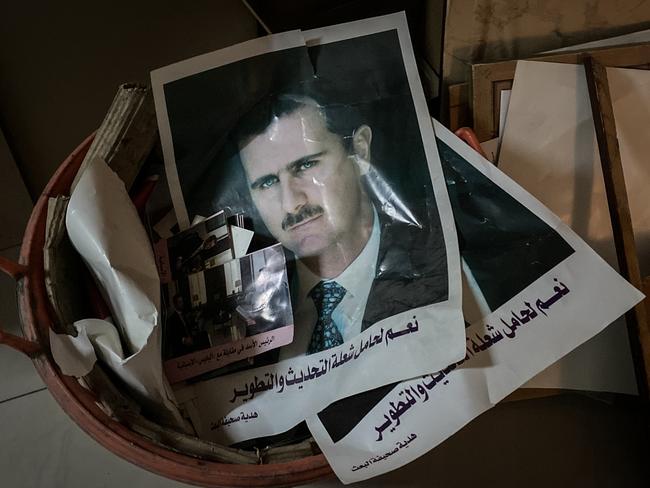
Mr Pedersen also called for “increased, immediate” aid to war-ravaged Syria, saying it had been through “an enormous … humanitarian crisis”.
“We need to make sure that Syria receives increased, immediate humanitarian assistance,” he said.
Meanwhile, Turkey is ready to provide military support to Syria’s new Islamist-led government set up by rebels who overthrew Bashar al-Assad if it requests it, Defence Minister Yasar Guler said.
He said the new leadership should be given “a chance” and that Turkey was “ready to provide the necessary support” if needed, in remarks reported by state news agency Anadolu and other Turkish media outlets.
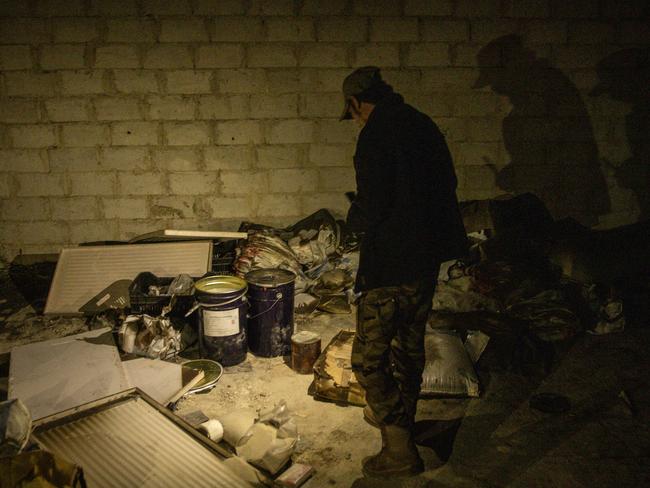
“It is necessary to see what the new administration will do. We think it is necessary to give them a chance,” Guler said of the Hayat Tahrir al-Sham rebel alliance, which is rooted in al-Qaeda’s Syria branch and designated a “terrorist” organisation by many Western governments.
But HTS has sought to moderate its rhetoric and its transitional government has insisted the rights of all Syrians would be protected along with the rule of law.
“We have military training and co-operation agreements with many countries. We are ready to provide the necessary support if the new administration requests it,” the Turkish defence minister said, without specifying what might be provided.
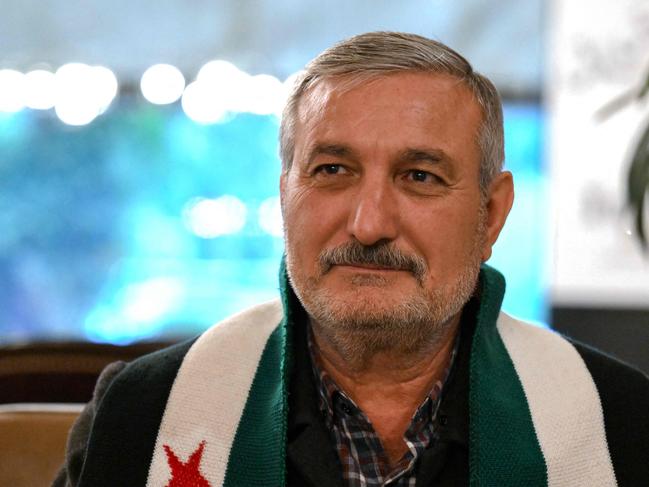
It comes as Syrian rebel leader Riad al-Asaad told AFP he was confident that the myriad of factions which helped topple Bashar al-Assad after years of war will now unite as one force.
The UK said it had been in “diplomatic contact” with the Syrian rebels, according to Foreign Secretary David Lammy.
“We want to ensure that there is not continuing violence,” he said.
FREED PRISONERS REVEAL HORRORS OF SYRIAN JAIL
A freed prisoner has recalled the horror of being locked in one of Assad’s notorious dungeon jails.
Mohammed Darwish, a 34-year-old journalist, was held with around 100 others for months by one of the most feared branches of the former government’s many-tentacled intelligence services over unfounded accusations he had supplied informations to “terrorists”.
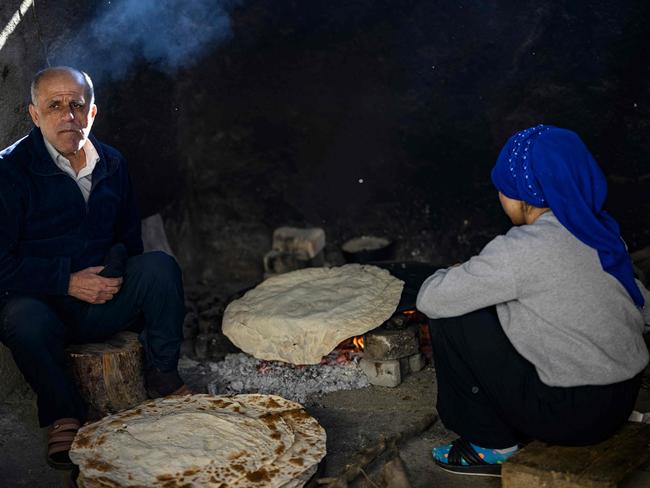
“I was one of those they interrogated the most,” Darwish told AFP of his ordeal in 2018. “Every day, morning and night” for the 120 days he was detained.
He said people were held after “arbitrary arrests and with no charges ever laid” against them.
Darwish recalled being kept in the cell which held some 50 prisoners with tuberculosis. He also remembered a young Turkish inmate he said was driven mad by the lashes that rained down upon him.
“When the door closed behind us, we were plunged into the depths of despair. This cell was witness to so much tragedy,” he said.
In one dark room, AFP saw a woman whose face was covered with a grey scarf rummage desperately through a pile of abandoned ID cards.
Thousands like her have swarmed the country’s notorious houses of detention over the past week, looking for evidence that might lead them to loved ones who had disappeared under Assad’s rule.
And some former prisoners, like Darwish, are also returning as free men to where they were once incarcerated, trying to find closure.
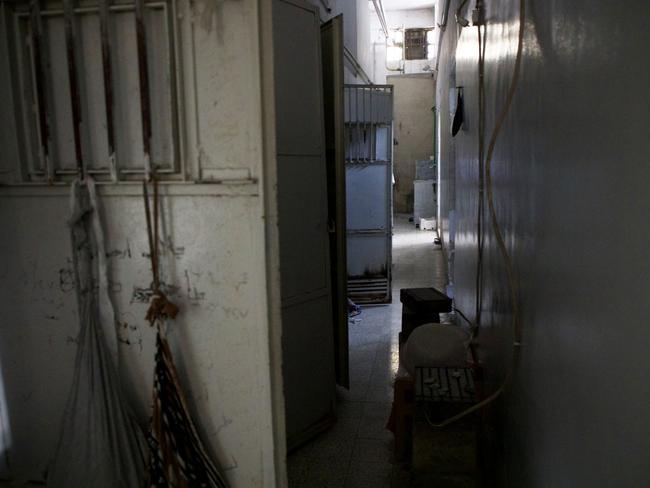
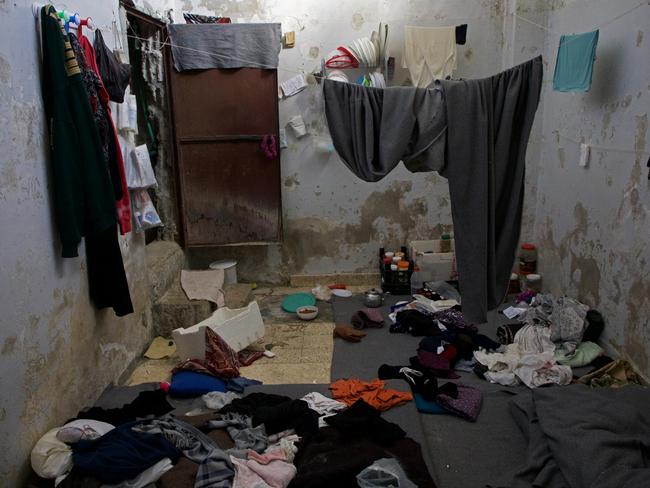
Adham Bajbouj, 32, is another former prisoner. “They told us our stay at the Palestine Branch was just for a question-and-answer session,” he said.
“But I was in there for 35 days. Or maybe it was 32, I no longer remember very well,” Bajbouj said.
His brother, who was accompanying him, did remember one key detail. “He weighed 85 kilos (187 pounds) when he arrived, and was just 50 when he got out,” he said.
As well as being questioned, prisoners were subject to constant humiliation. “We had to scrub clean the torture areas and toilets, and drag the dead from the cells,” said Bajbouj, who is still frail and said that this was his first time near the building since his release.
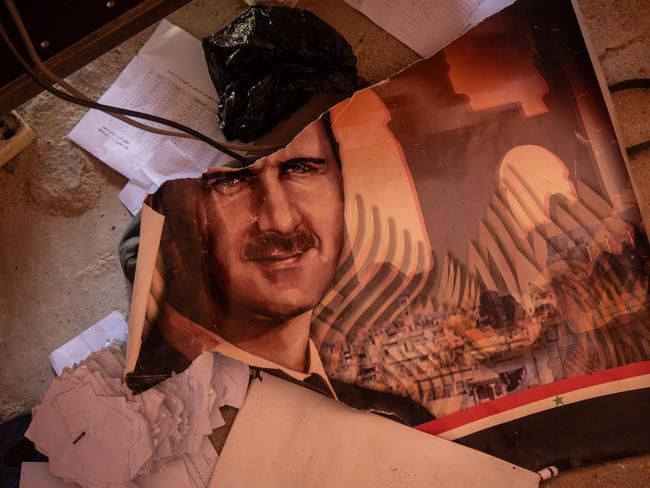
SYRIAN REBELS DESTROY ZOMBIE DRUG STASH
A massive secret stash of zombie drug “Captagon” has been uncovered and destroyed in Syria by Islamic jihadists groups that overthrew the Assad regime.
The dramatic collapse of Bashar al-Assad’s Syrian regime has thrown light into the dark corners of his rule, including the industrial-scale export of the banned drug Captagon.
Islamist-led fighters have seized military bases and distribution hubs for the amphetamine-type stimulant, which has flooded the black market across the Middle East.
Led by the Hayat Tahrir al-Sham (HTS) group, the rebels say they found a vast haul of drugs and vowed to destroy them.
HTS fighters showed a warehouse at a quarry on the outskirts of Damascus, where Captagon pills were concealed inside electrical components for export.
“After we entered and did a sweep, and we found that this is a factory for Maher al-Assad and his partner Amer Khiti,” said black-masked fighter Abu Malek al-Shami.
Maher al-Assad was a military commander and the deposed strongman’s brother, now presumed on the run. He is widely accused of being the power behind the lucrative Captagon trade.
Syrian politician Khiti was placed under sanction in 2023 by the British government, which said he “controls multiple businesses in Syria which facilitate the production and smuggling of drugs”.
In a cavernous garage beneath the warehouse and loading bays, thousands of dusty beige Captagon pills were packed into the copper coils of brand new household voltage stabilisers.
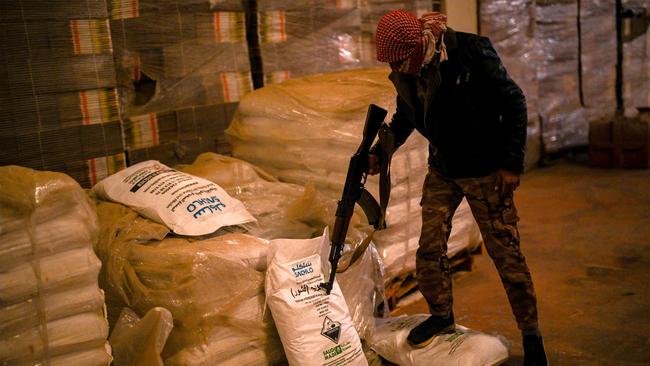
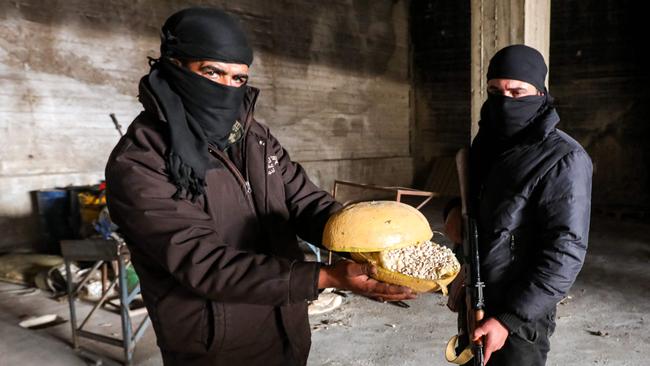
“We found a large number of devices that were stuffed with packages of Captagon pills meant to be smuggled out of the country. It’s a huge quantity. It’s impossible to tell,” Shami said.
Above, in the warehouse, crates of cardboard boxes stood ready to allow the traffickers to disguise their cargo as pallet-loads of standard goods, alongside sacks and sacks of caustic soda.
Caustic soda, or sodium hydroxide, is a key ingredient in the production of methamphetamine, another stimulant.
VIDEO: 🇸🇾 Assad government's captagon trade exposed in Syria
— AFP News Agency (@AFP) December 13, 2024
The collapse of Bashar al-Assad's government in Syria has thrown light into the dark corners of his rule, including the industrial-scale export of the banned amphetamine-type stimulant#AFPVerticalpic.twitter.com/KRf3Xpmh94
Assad fell at the weekend to a lightning HTS offensive, but the revenue from selling Captagon propped up Assad’s government throughout Syria’s 13 years of civil war.
Captagon turned Syria into the world’s largest narco state. It became by far Syria’s biggest export, dwarfing all its legal exports put together, according to estimates drawn from official data during a 2022 AFP investigation.
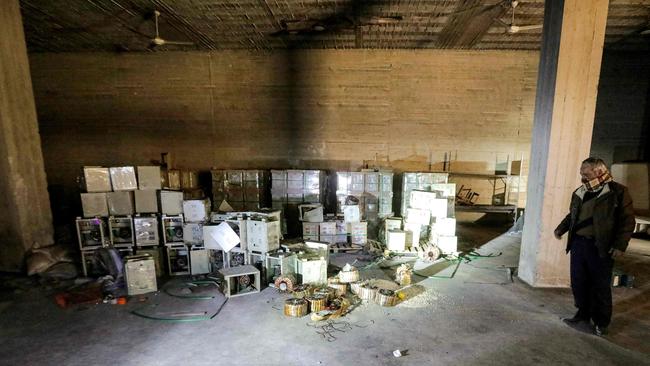
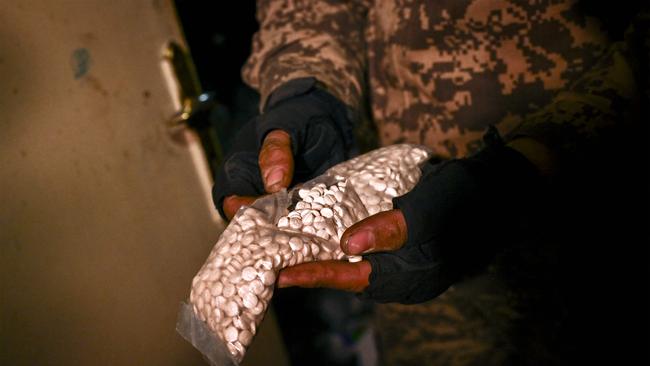
Captagon fuelled an epidemic of drug abuse in wealthy Gulf states, even as Assad sought ways to end his diplomatic isolation among his peers, wrote Carnegie scholar Hesham Alghannam.
Assad, he wrote, “leveraged Captagon trafficking as a means of exerting pressure on the Gulf states, notably Saudi Arabia, to reintegrate Syria into the Arab world”, which it did in 2023 when it rejoined the Arab League bloc.
More Coverage
Originally published as Mass graves uncovered in the wake of Syrian president’s ouster


